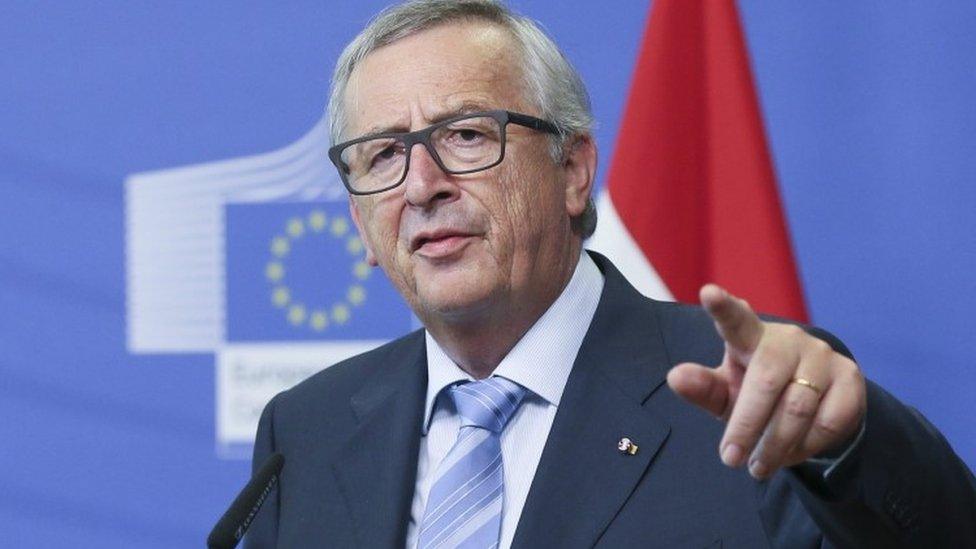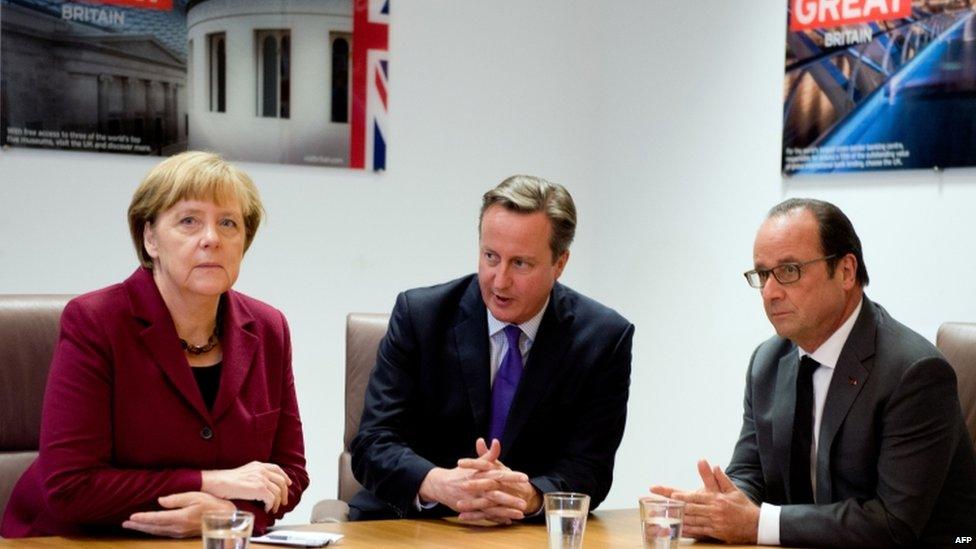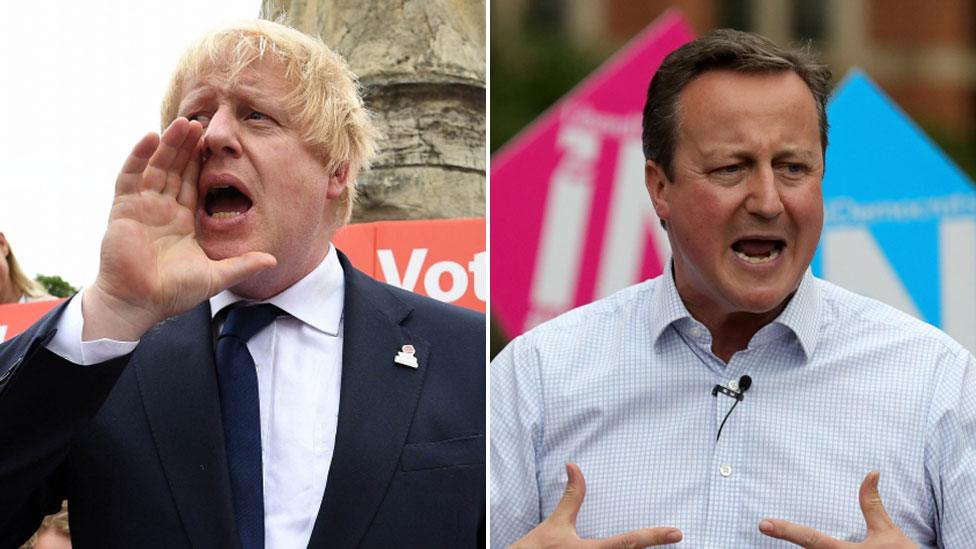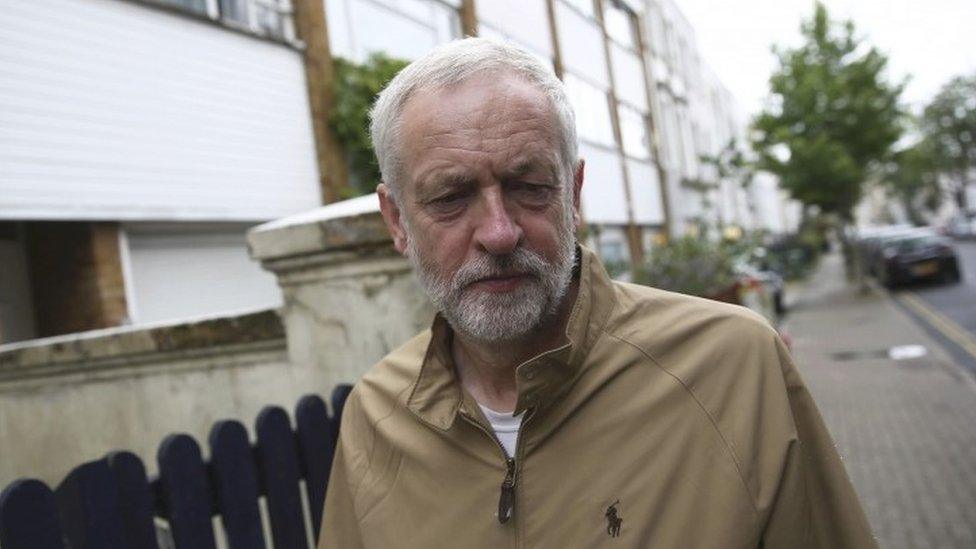EU referendum: Juncker in 'out is out' warning to UK
- Published

The UK will not be able to return to the negotiating table if it votes to leave the European Union, one of the EU's top officials has said.
Speaking on the eve of the referendum, European Commission President Jean-Claude Juncker said the outcome would be final and "out is out".
And the UK would not get a better deal than the one already negotiated by Prime Minister David Cameron.
Leave supporter Boris Johnson called Mr Juncker an "unelected tin-pot figure".
The former mayor of London said the remarks showed Mr Cameron's belief that the UK could achieve further reform to immigration rules from within the EU were a "sham, snare and a delusion".
In less than 24 hours, UK voters will head to the polls to decide whether the country remains in the EU or leaves - a decision that the leaders of the EU's 27 other states have said will have profound consequences not only for the UK but for the future direction of the EU.
'Maximum deal'
Asked about the consequences of a Brexit vote, Mr Juncker made it clear there would be no scope for further negotiations over better terms to try to keep the UK on board.
"I have to add that the British policymakers and the British voters have to know there will be no kind of any renegotiation," he told reporters after talks with new Austrian Chancellor Christian Kern.
"We have concluded a deal with the prime minister, he got the maximum he could receive, we gave the maximum we could give.
"So there will be no kind of renegotiation, nor on the agreement we found in February, nor as far as any kind of treaty negotiations are concerned. Out is out.
His words were echoed by the French President, Francois Hollande, who said a decision by Britain to leave would be "irreversible".
'Wrong choice'
Mr Cameron has insisted the UK would be leaving the EU for good and future generations will not be able to "undo" the result.
Speaking on Wednesday, he said: "You can't jump out the aeroplane and then clamber back through the cockpit hatch."
It is understood Mr Juncker was not referring to the prospect of future reforms in the event of the UK voting to remain in the EU, something Mr Cameron has insisted will continue, including in the key area of immigration and free movement.

European leaders are urging the UK to vote to stay in the EU
But those campaigning for the UK to leave the EU seized on the remarks, with Mr Johnson saying they had "given the game away".
"If we stay in, there is no prospect of any further change," Mr Johnson said. "This is it, folks. We have been told from the horse's mouth that any hope of further change is absolute illusion."
He added: "It is time for us to show our courage and our commitment to democracy by standing up to these unelected tin-pot figures."
And UKIP's Nigel Farage said it was the "last chance saloon" for the UK.
The BBC's political editor Laura Kuenssberg said Mr Juncker's comments would be "used by both sides", adding that they "underline PM's 'out means out' message, but undermine suggestions that if we stay in we can keep pushing reform".
'Mistake'
European leaders have implored British voters to think carefully before separating themselves from the EU,
German Chancellor Angela Merkel said she wanted the UK to remain, while Italian prime minister Matteo Renzi said Brexit would be a mistake of historic proportions and out of keeping with the British character.
"Seen from Italy, a vote to leave Europe would not be a disaster, a tragedy or the end of the world for you in the UK," he wrote in the Guardian, external. "It would be worse, because it would be the wrong choice.
"It would be a mistake for which you the voters primarily would pay the price."
And the secretary general of Nato told the same newspaper, external that a "fragmented Europe" risked greater instability on the continent.
While maintaining the decision was one for the British public, Jens Stoltenberg said "a strong UK in a strong Europe is good for the UK".
He added: "It's good for Nato, because we are faced with unprecedented security challenges, with terrorism, with instability and an unpredictable security environment, and a fragmented Europe will add to instability and unpredictability."
Leave campaigners have said the EU has the ambition of creating a pan-European army and duplicating Nato military structures, claims rejected by the UK government.
- Published22 June 2016

- Published19 June 2016
